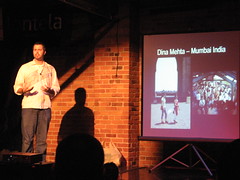 Speaking is hard, but I'm learning. Last night I ended a run of speaking that spanned 4 events, 2 different talks and wide variety of audiences over a couple of weeks. It's been a great chance to try out some of the things I've learned from the speaking coach and discover a lot of things that still need work.
Speaking is hard, but I'm learning. Last night I ended a run of speaking that spanned 4 events, 2 different talks and wide variety of audiences over a couple of weeks. It's been a great chance to try out some of the things I've learned from the speaking coach and discover a lot of things that still need work.
Energy, Energy
I'm having a heard time sustaining energy in my talks. For the first half of my talks or so, I'm energized and show enthusiasm. However, towards the end, I seem to fade - my energy level falls, my voice becomes softer and my body language shows less confidence. I appear to end slides on a down note instead of driving each point home. Though it's getting easier, maintaining that energy is deceptively hard - I don't notice it. From now on I'm going to think about each slide as a new beginning and put work into having some punch at the end of each point.
No Apologies
I've read from a number of experienced speakers that it's not a good idea to apologize when things go wrong. The key is that the audience does not know the difference - you're bringing attention to something that would have gone unnoticed. During my talk at Refresh Seattle , my remote control slide advancer didn't work well - I had to push the button multiple times. Each time this happened, I apologized. What I should have done was remedy the situation by moving closer, or kept my apologies to myself. The real remedy was to get a new battery - duh!
No Redundancy
In one of my talks, I have slides with a few points that provide a summary for the previous slides. Each point appears individually as I talk about them and each slide has a major, overall point at the beginning. The problem I had was talking too much about that first major point. In a couple of cases, I was redundant because I mentioned something during the major point and then had it appear as a sub-point later in the slide. To prevent this, I could practice more and know my slides better. Or, I could cut out the redundant point and continue making it at the beginning - as a part of the major point. I think cutting things out can be a good practice.
Slow Down, Be Clear
I'm still speaking too fast and not enunciating. This is really hard for me and will take more practice. I've spoken fast my whole life and it's not easy to change.
But I'm Learning
It appears that I've developed some good habits in my speaking - habits that I learned from coaching. First, I'm comfortable with my feet planted in one place. I no longer feel the need do dance around in a box-step motion. Also, I feel comfortable looking into the audience and making points to individuals in the crowd. The sense of dread I used to have has all but disappeared, though I'm still quite anxious. As I mentioned before, the ultimate goal is confidence and I feel a little more with each talk.